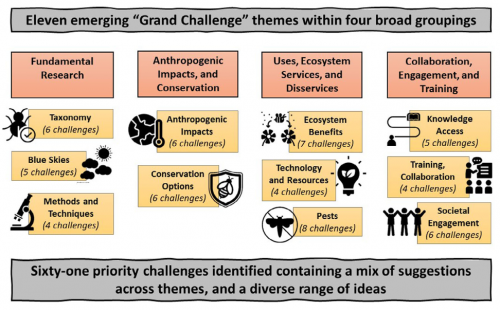With the rapid pace of anthropogenic environmental change, as well as global challenges such as climate change, and widespread biodiversity loss, there is a need to further develop our understanding of insects to maximise the benefits and minimise the harm associated with them. Entomology is essential for comprehending terrestrial and freshwater ecosystems and holds the potential to assist humanity in various areas, including improving agricultural practices, managing vector-borne diseases, and stimulating technological breakthroughs.
A new publication co-funded by SHOWCASE highlights the untapped potential of entomology in addressing these global challenges and considers what entomology can achieve in the coming decades. The publication details the collaborative exercise conducted by the Royal Entomological Society (RES) to pinpoint an array of present and prospective ‘Grand Challenges in Entomology’. It identifies 61 high-priority challenges and delineates the approaches used to obtain them. The paper also ponders over the implications of these findings for the future of entomology and its contribution to society.
Read the full paper here.
Photo: Schematic illustration of 11 “Grand Challenge” themes that emerged from the prioritisation process (light orange boxes, with grey outlines), organised within four broad topic groupings (dark orange boxes, with black outlines). The final list of priorities included 61 challenges spread across these themes. Number of challenges within each theme are shown in parentheses under each theme heading. Image is from NounProject.com.
